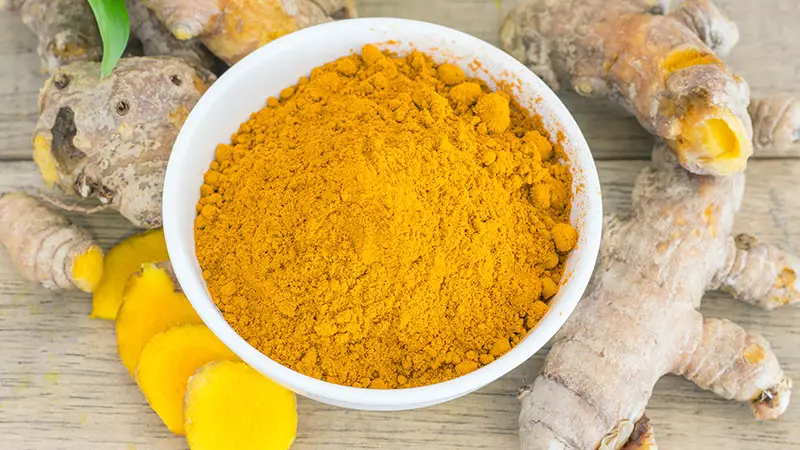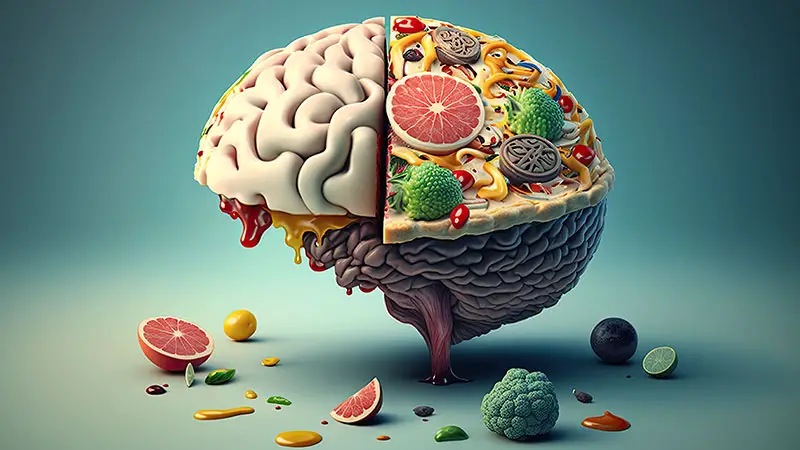Ever wondered what foods can boost your brainpower and enhance cognitive function? The answer lies in incorporating nutrient-rich foods into your diet that support brain health.
Consuming a balanced diet packed with vitamins, minerals, antioxidants, and healthy fats can significantly improve memory, focus, and overall mental performance.
From fatty fish rich in omega-3 fatty acids to vibrant berries loaded with antioxidants, the right foods can protect your brain from oxidative stress and inflammation, while promoting better communication between brain cells.
In this blog post, we will explore the best foods to eat for your brain, highlighting their unique benefits and how they can help you stay sharp, focused, and mentally agile.
Embrace these brain-boosting foods to enhance your cognitive abilities and support long-term brain health.

10 Best Foods To Eat for Your Brain
Maintaining optimal brain health is crucial for overall well-being and cognitive function. The foods we eat play a significant role in supporting brain health, improving memory, and enhancing mental performance.
Here are ten of the best foods to eat for your brain, described in detail, each with its unique benefits:
1. Fatty Fish (Salmon, Sardines, Trout)

Fatty fish are excellent sources of omega-3 fatty acids, particularly EPA (eicosapentaenoic acid) and DHA. These essential fatty acids play a vital role in brain health, as DHA is a major structural component of brain tissue and EPA has anti-inflammatory effects.
Regular consumption of fatty fish has been associated with improved cognitive function, memory, and reduced risk of cognitive decline with age. Omega-3s also support the formation of new nerve cells and enhance neurotransmitter function, promoting efficient communication between brain cells.
2. Blueberries

Blueberries are rich in antioxidants, particularly flavonoids such as anthocyanins, which have been shown to accumulate in the brain and improve cognitive function.
These compounds help protect brain cells from oxidative stress and inflammation, which can contribute to neurodegenerative diseases and cognitive decline. Studies suggest that regular consumption of blueberries may improve memory and delay age-related decline in cognitive function.
Additionally, blueberries have been linked to improved communication between brain cells, enhanced neuroplasticity, and reduced oxidative damage to DNA, all of which support overall brain health.
3. Broccoli

Broccoli is a cruciferous vegetable rich in antioxidants, vitamins, and minerals that support brain health. It is particularly high in vitamin K, which is essential for forming sphingolipids, a type of fat densely packed into brain cells.
Vitamin K has been linked to better verbal episodic memory performance, while other antioxidants in broccoli, such as vitamin C and flavonoids, contribute to reducing oxidative stress and inflammation in the brain.
Sulforaphane, a compound found in broccoli, may also have protective effects against neurodegenerative diseases by stimulating the production of enzymes that protect neurons from oxidative stress.
4. Walnuts

Walnuts are a rich source of alpha-linolenic acid (ALA), a plant-based omega-3 fatty acid, as well as antioxidants and polyphenols that support brain health. Consuming walnuts has been associated with improved cognitive function, memory, and mood.
The antioxidants in walnuts help combat oxidative stress and inflammation in the brain, while ALA supports the development of new neurons and enhances synaptic plasticity, which is crucial for learning and memory.
Regular walnut consumption has also been linked to a lower risk of neurodegenerative diseases, such as Alzheimer’s disease, due to its protective effects on brain cells.
5. Dark Chocolate

Dark chocolate with a high cocoa content (70% or more) is a rich source of flavonoids, particularly flavonols such as epicatechin and catechin.
These compounds have antioxidant and anti-inflammatory properties that can benefit brain health. Flavonoids increase blood flow to the brain, which can improve cognitive function, memory, and attention span.
Dark chocolate also contains caffeine and theobromine, which can enhance brain function in the short term by improving alertness and mood.
Consuming dark chocolate in moderation has been associated with better cognitive performance, reduced risk of neurodegenerative diseases, and improved mood due to its ability to stimulate the release of endorphins.
6. Turmeric

Turmeric is a spice known for its vibrant yellow color and active compound curcumin, which has potent antioxidant and anti-inflammatory properties.
Curcumin crosses the blood-brain barrier and has been shown to support overall brain health by promoting neurogenesis (the growth of new neurons) and enhancing cognitive function.
It can also help alleviate symptoms of depression and anxiety by modulating neurotransmitters such as serotonin and dopamine.
Studies suggest that regular consumption of turmeric may protect against neurodegenerative diseases like Alzheimer’s and Parkinson’s by reducing inflammation, oxidative stress, and the accumulation of beta-amyloid plaques in the brain.
7. Pumpkin Seeds

Pumpkin seeds are packed with nutrients essential for brain health, including magnesium, zinc, copper, iron, and antioxidants like vitamin E. Magnesium plays a crucial role in cognitive function and mood regulation, while zinc is involved in synaptic plasticity and memory formation.
Pumpkin seeds also contain omega-3 fatty acids and antioxidants that protect brain cells from oxidative damage. The high levels of magnesium in pumpkin seeds help regulate neurotransmitter activity, contributing to improved learning and memory.
Additionally, the zinc content supports the brain’s ability to form and maintain synaptic connections, which are essential for optimal brain function.
8. Oranges

Oranges and other citrus fruits are rich in vitamin C, a powerful antioxidant that helps protect brain cells from oxidative stress. Vitamin C supports the production of neurotransmitters such as serotonin, which plays a key role in mood regulation and cognitive function.
It also enhances the absorption of iron from plant-based foods, ensuring an adequate supply of oxygen to the brain. Consuming oranges and citrus fruits regularly has been associated with improved cognitive performance, memory, and a reduced risk of age-related cognitive decline.
The flavonoids found in oranges also have anti-inflammatory properties that may help protect against neurodegenerative diseases.
9. Eggs

Eggs are a nutrient-dense food rich in several brain-boosting nutrients, including choline, vitamin B12, and folate. Choline is essential for the production of acetylcholine, a neurotransmitter that plays a crucial role in memory and cognitive function.
Vitamin B12 and folate are involved in methylation processes that support brain health and cognitive development. Eggs also contain high-quality protein, which provides amino acids necessary for neurotransmitter synthesis and brain cell communication.
Regular consumption of eggs has been linked to improved memory, cognitive performance, and reduced risk of cognitive decline with age.
The antioxidants lutein and zeaxanthin found in egg yolks may also protect against oxidative stress and inflammation in the brain.
10. Green Tea

Green tea is rich in antioxidants, particularly catechins and polyphenols, which have protective effects on brain cells.
The main catechin in green tea, epigallocatechin gallate (EGCG), has been studied for its ability to enhance cognitive function, improve memory, and protect against neurodegenerative diseases.
EGCG crosses the blood-brain barrier and exerts neuroprotective effects by reducing oxidative stress, inflammation, and the accumulation of beta-amyloid plaques associated with Alzheimer’s disease.
Green tea also contains L-theanine, an amino acid that promotes relaxation and improves attention and focus.
Regular consumption of green tea has been associated with better cognitive performance, enhanced brain connectivity, and a reduced risk of cognitive decline in older adults.
Incorporating these ten best foods for your brain into your diet can significantly enhance cognitive function, memory, and overall brain health.
From fatty fish rich in omega-3s to antioxidant-packed berries and brain-boosting spices like turmeric, each food offers unique nutrients and benefits that support optimal brain function.
Other Habits for a Healthy Brain

While incorporating nutrient-rich foods into your diet is crucial for brain health, adopting certain lifestyle habits can further support cognitive function, memory, and overall brain health. Here are several habits that promote a healthy brain:
Regular Physical Exercise
Physical exercise is beneficial not only for your body but also for your brain.
Engaging in regular aerobic exercise, such as walking, running, or swimming, increases blood flow to the brain and stimulates the release of growth factors that promote the formation of new brain cells and connections.
Exercise has been shown to improve memory, cognitive function, and mood while reducing the risk of cognitive decline and neurodegenerative diseases. Aim for at least 150 minutes of moderate-intensity exercise per week to reap the brain-boosting benefits.
Quality Sleep
Sleep plays a crucial role in memory consolidation and brain function. During sleep, the brain processes and stores information from the day, facilitating learning and memory retention.
Chronic sleep deprivation has been linked to cognitive impairment, mood disorders, and an increased risk of neurodegenerative diseases. Aim for 7-9 hours of quality sleep per night to support optimal brain health.
Establishing a consistent sleep schedule, creating a relaxing bedtime routine, and avoiding stimulants like caffeine and electronics before bed can promote restful sleep.
Mental Stimulation
Keeping your brain active and engaged through mental stimulation is essential for cognitive function and brain health.
Activities such as reading, puzzles, playing musical instruments, learning new skills, or engaging in strategic games like chess or Sudoku can help maintain cognitive abilities and build neural connections.
Challenging your brain regularly encourages neuroplasticity, the brain’s ability to reorganize and adapt in response to learning and experience. Incorporate mentally stimulating activities into your daily routine to keep your brain sharp and resilient.
Social Engagement
Maintaining social connections and engaging in meaningful relationships is beneficial for brain health and overall well-being. Social interaction stimulates cognitive function, enhances mood, and provides emotional support, which can reduce stress and improve resilience against cognitive decline.
Participate in social activities, join clubs or groups with shared interests, or volunteer in your community to stay socially connected. Regular interactions with friends, family, and peers can have a positive impact on brain health and contribute to a fulfilling life.
Stress Management
Chronic stress can have detrimental effects on brain health, including impairing memory, reducing cognitive function, and increasing the risk of neurodegenerative diseases.
Practicing stress management techniques such as mindfulness meditation, deep breathing exercises, yoga, or spending time in nature can help reduce stress levels and promote brain health.
Incorporate relaxation techniques into your daily routine to enhance resilience against stress and support cognitive function.
Hydration
Proper hydration is essential for brain health and function. Dehydration can impair cognitive performance, concentration, and mood.
Aim to drink an adequate amount of water throughout the day to maintain optimal hydration levels. While individual needs vary, a general guideline is to consume about 8 glasses of water daily, or more depending on activity level and climate.
Drinking water supports the transport of nutrients and oxygen to the brain, helps flush out toxins, and maintains overall cognitive function and mental clarity.
Limit Alcohol and Avoid Smoking
Excessive alcohol consumption and smoking can have detrimental effects on brain health.
Chronic alcohol abuse can lead to cognitive impairment, memory loss, and an increased risk of neurodegenerative diseases such as dementia. Smoking damages blood vessels and reduces blood flow to the brain, which can impair cognitive function and increase the risk of stroke and dementia.
Limit alcohol intake to moderate levels (one drink per day for women, two drinks per day for men) and avoid smoking to protect brain health and reduce the risk of cognitive decline.
Wrapping Up
Incorporating brain-boosting foods into your diet is a simple yet effective way to enhance cognitive function and support long-term brain health.
Foods rich in omega-3 fatty acids, antioxidants, vitamins, and minerals, such as fatty fish, berries, leafy greens, nuts, and seeds, can improve memory, focus, and overall mental performance.
These nutrient-dense options help protect your brain from oxidative stress and inflammation while promoting better communication between brain cells. By making mindful dietary choices, you can fuel your brain with the essential nutrients it needs to thrive.
Embrace these foods as part of a balanced diet to stay sharp, focused, and mentally agile throughout your life. Prioritizing brain health through nutrition is a proactive step towards maintaining cognitive vitality and enhancing your overall well-being.
